Journal article
Oct 30 2023

Law matters – assessment of country-level code implementation and sales of breastmilk substitutes in South Asia (Ching C, Sethi V, et al. Frontiers in Public Health. 2023)
This study examines the status of implementation of the International Code of Marketing of Breast-milk Substitutes of eight countries in the South Asia region (Afghanistan, Bangladesh, Bhutan, India, Maldives, Nepal, Pakistan, and Sri Lanka), and describes the sales value and volume of commercial
Presentation, Video
Aug 26 2022
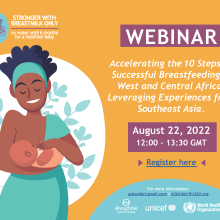
Accelerating the 10 Steps to Successful Breastfeeding in West and Central Africa: Leveraging Experiences from Southeast Asia
In August 2022, UNICEF, WHO, Irish Aid and Alive & Thrive's offices in West Africa and Southeast Asia collabor
Announcement
Aug 01 2022
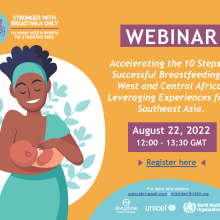
WEBINAR: Accelerating the 10 Steps to Successful Breastfeeding in West and Central Africa. Leveraging Experiences from Southeast Asia
The Stronger with Breastmilk Only regional initiative, a collaboration of UNICEF, WHO and Alive & Thrive, is pleased to invite stakeholders to a 90-minute webinar on August 22 at 12:00 GMT to discuss how to accelera
Brief
Jul 16 2022
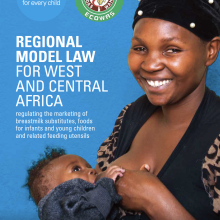
Regional Model Law for regulating the marketing of BMS
As part of the efforts to protect breastfeeding and save lives, UNICEF, WHO, Alive & Thrive, HKI and IBFAN, in collaboration with the West African Health Organization (WAHO), have developed a regional model law for regulating the marketing of breastmilk substitutes, foods for infants and youn
Guide/Manual
Feb 09 2022
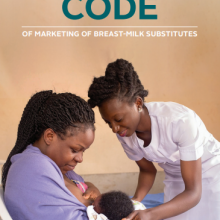
A Quick Guide: The International Code of Marketing for Breast-milk Substitutes
Updated February 2022!
This quick guide summarizes the International Code of Marketing of Breast-milk Substitutes (The Code) and relevant resolutions of the World Health Assembly that help protect breastfeeding around the globe.
Brief, Job aid
May 16 2021
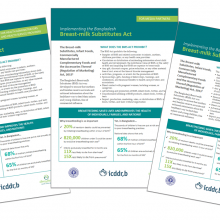
Implementing the Breast-Milk Substitutes Act in Bangladesh: Guidance for employers, media and health administrators
These three briefs explain the Bangladesh Breast-Milk Substitutes Act and what specific stakeholders - company owners, health administrators and the media - need to know about it.

